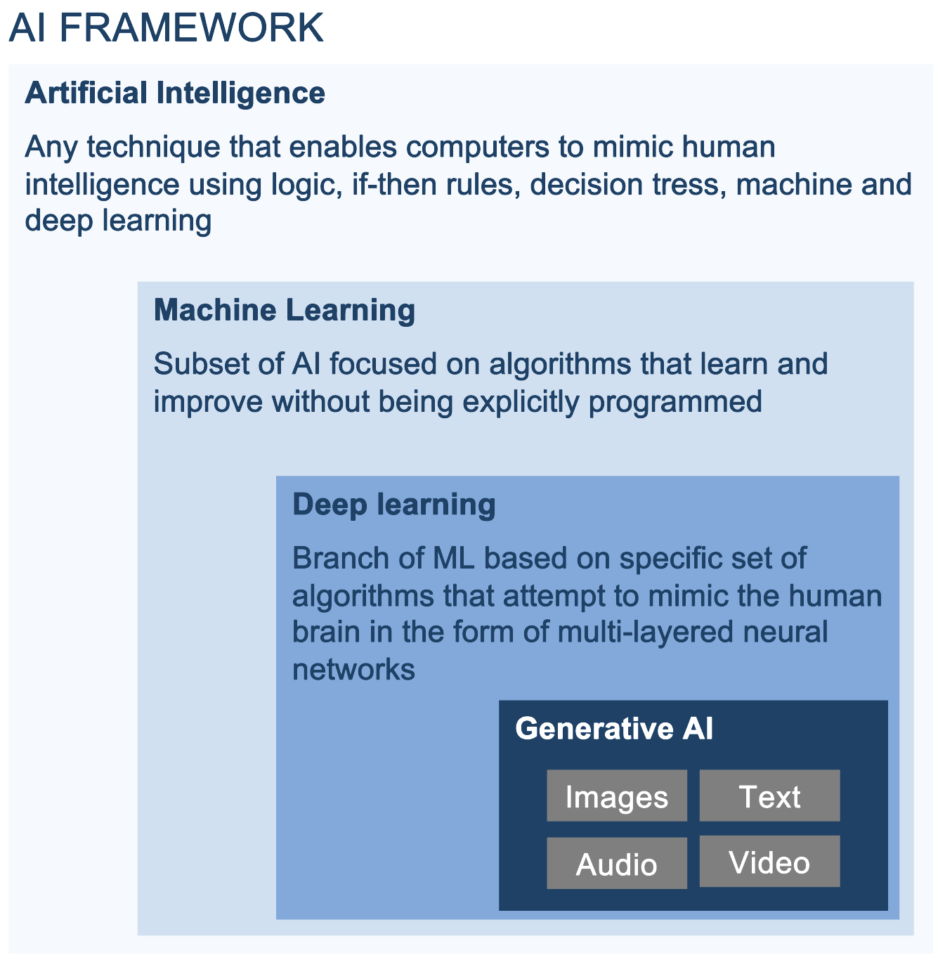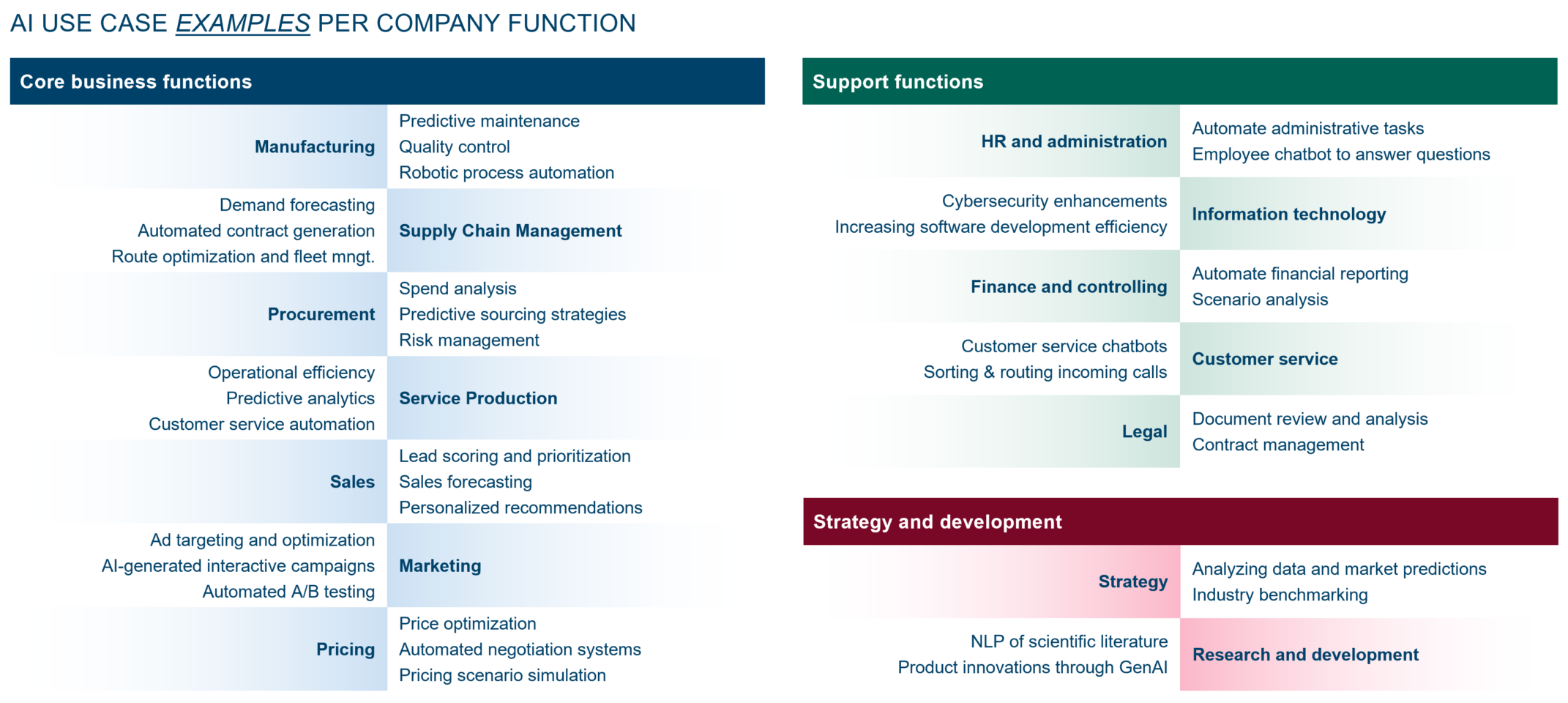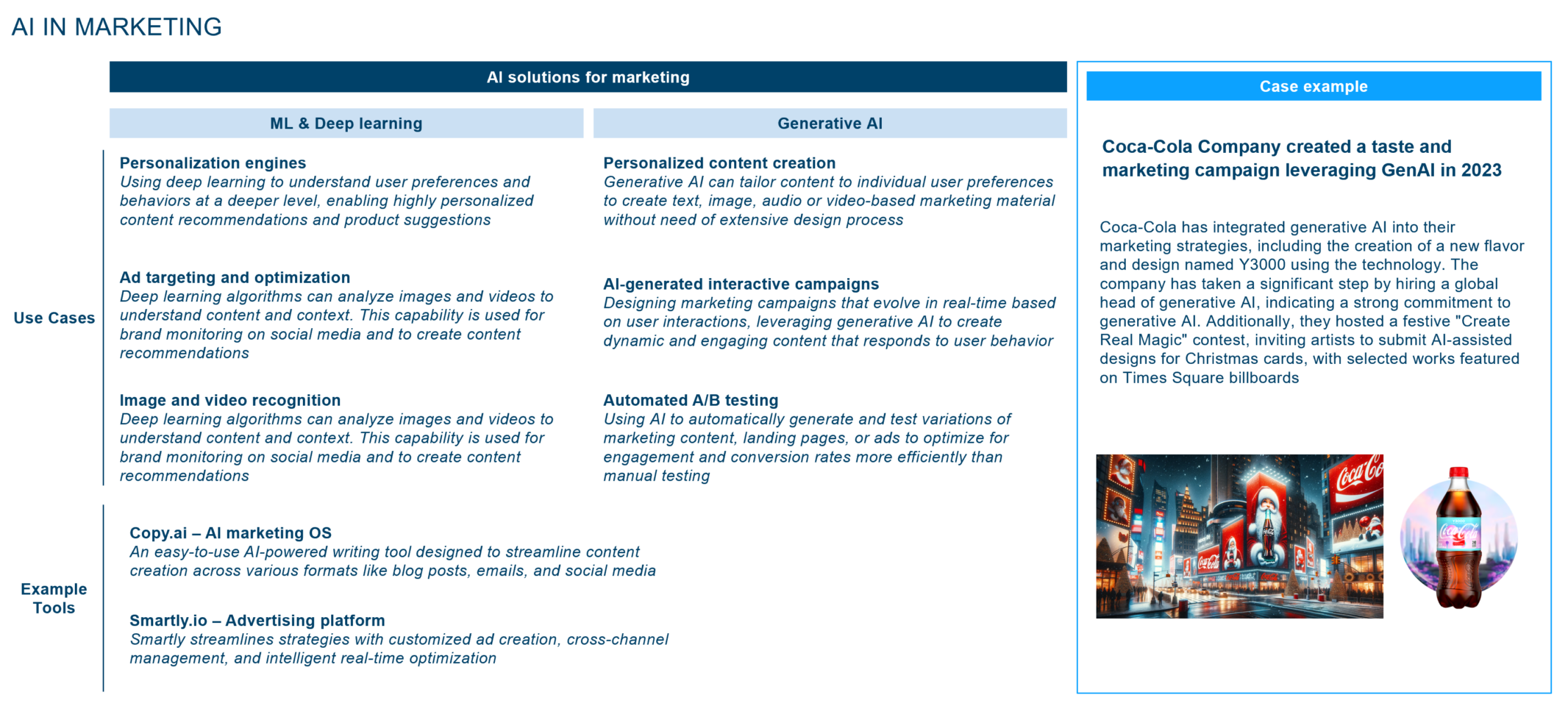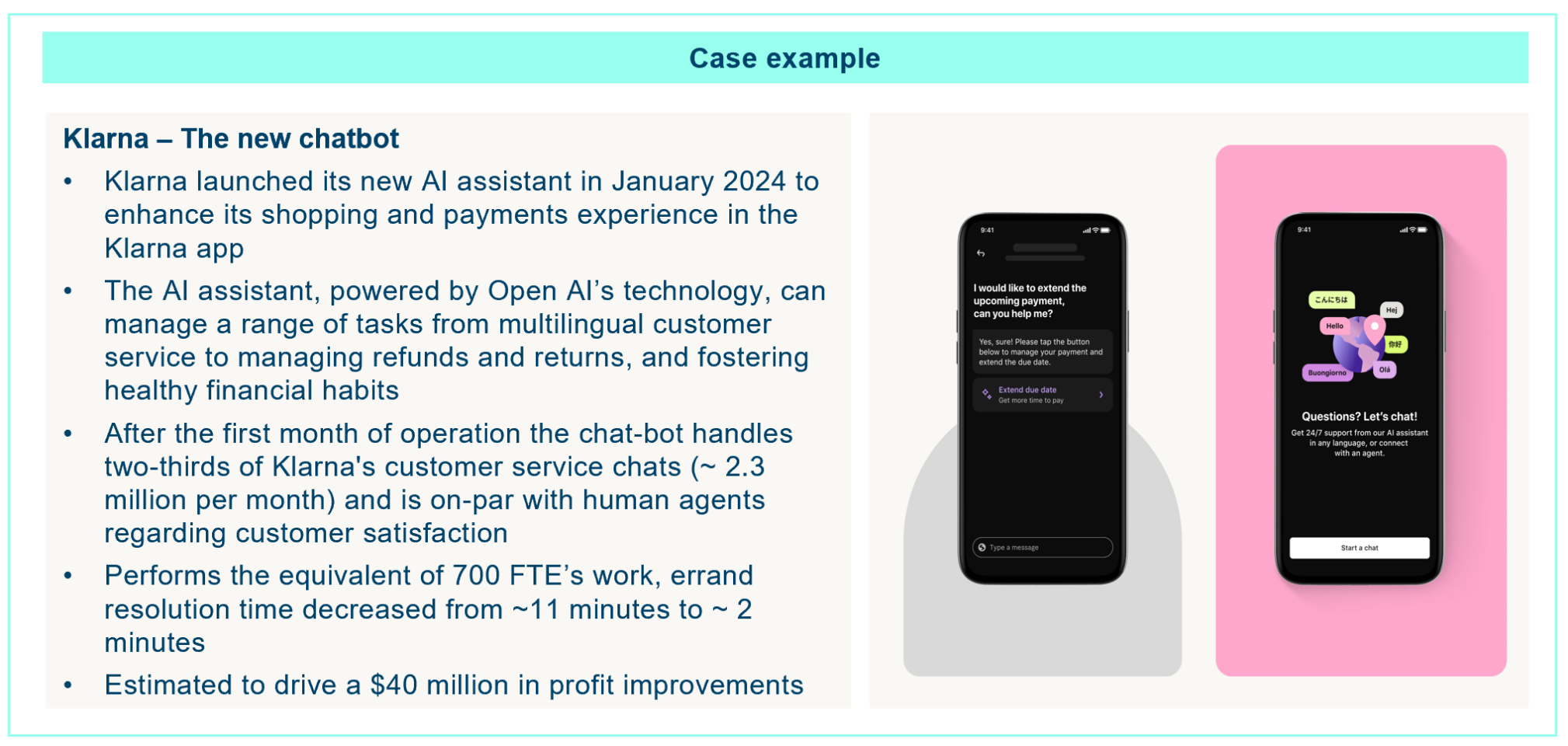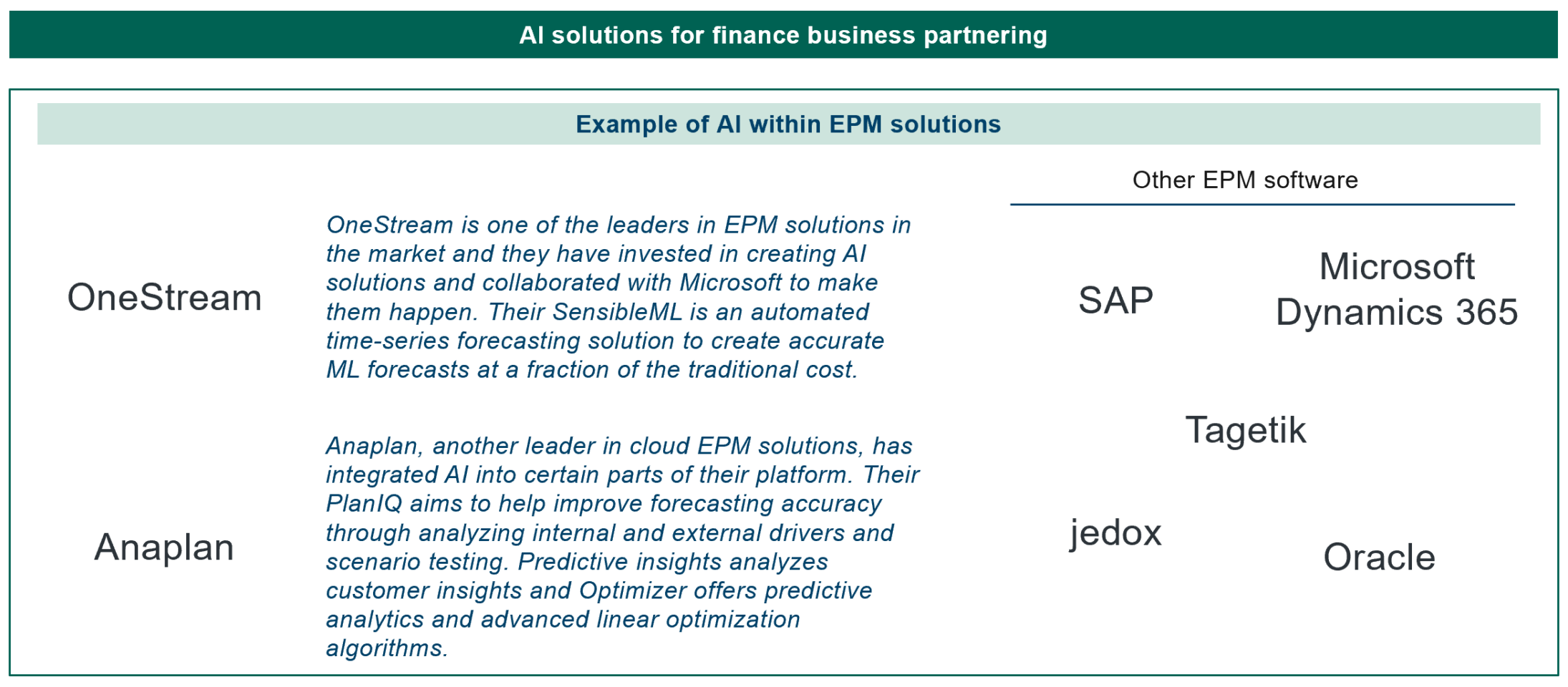What you should know about AI use cases and products in different company functions
8.4.2024
The AI world has been evolving quickly over the past year and a half, mainly due to advancements in generative AI. However, generative AI is only a small part of the AI framework and there are a lot of new advancements being made elsewhere also. Over time AI has spread from optimizing certain company operations to products and services that improve efficiency widely across all company functions. Thus, awareness of the broad opportunities AI presents is crucial.
Our research shows that AI tools and services are now available for all company functions. A key trend is the seamless integration of AI into prevalent systems like ERPs, CRM and EPM (Enterprise Performance Management) tools. Additionally, there’s been an increase in the use of GenAI chatbot based services such as ChatGPT and Copilot, along with building solutions leveraging technologies like Azure AI Studio. These are complemented by specialized solutions that address specific needs. The different ready-made solutions make it easier for companies to start the use of AI and see its real-world benefits without requiring the build of extensive highly customized AI solutions.
The new skill required from managers might well be the ability to choose the correct assortment of different AI services from different service providers for their use.
However, off-the-shelf products also bring inherent limitations and constraints, with most lacking customizability. External products can be used to refine existing workflows, but rarely offer a unique competitive advantage to companies. It still needs to come from elsewhere. Nonetheless, companies and managers must also keep an open mind on how AI could provide them with completely new business opportunities through e.g. product or business model innovations.
Generative AI is already making a difference in areas like marketing and customer service. In these adopting the new technological advancements is more straightforward to address business issues. In marketing generative AI can help create new content at unprecedented speed and quality while in customer service especially the improvements in chatbots have been revolutionary. Nonetheless, we will see more applications and real-world use cases of AI transforming company functions soon. One example is in financial steering where AI is being widely adopted by EPM providers especially for predictive forecasting and scenario testing but most likely the biggest impact is still yet to be seen.
Company functions – Overview
AI use cases and opportunities are usually assessed through the magnitude of their impact. However, examining use cases through company functions gives a fresh perspective and brings the subject closer to the daily lives of organizations. By dividing company functions into three categories—core business, support, and strategy & development—we can analyze AI from different angles. While there are overlapping use cases among these functions, their execution and outcomes still differ.
(Click image for full size.)
Functional example – Marketing
Marketing is one of the functions that AI is expected to change the most – at least in the short term. The new advancements in generative AI both in text but also image and latest video creation give marketing departments new opportunities especially in content creation. AI can generate creative and engaging content that appeals to the target audience. Also, due to the easiness of generating content it becomes much more feasible to do targeted marketing for smaller groups or even individuals. AI can also help marketers with data analysis, pattern recognition, identifying trends, preferences, and emotions.
An exciting example of AI-generated marketing is Coca-Cola’s campaign for its new flavor, Y3000, launched in 2023. The company co-created the flavor with AI and used it for content creation. Coca-Cola was also one of the first large corporations to hire a ‘Global head of generative AI’, proving their commitment to utilizing the new technology in their core business.
Coca-Cola’s AI-generated marketing campaign shows the potential of AI to transform the marketing field and create new opportunities for brands to connect with their customers. AI can help marketers save time, money, and resources, while enhancing their creativity and innovation. AI can also help marketers personalize and optimize their content, based on data-driven insights and feedback.
Functional example – Customer service
In customer service, generative AI has already left a significant impact, delivering substantial financial benefits. Klarna launched a new customer service chatbot in January 2024 and after a month of being globally live it has produced remarkable results. The AI assistant has handled 2.3 million conversations, two-thirds of all Klarna’s customer service chats. It is doing the equivalent of 700 FTE’s and is on-par with human agents in satisfaction scores and has decreased repeat inquiries by 25%. Klarna estimates a $40 million USD profit improvement from the chatbot alone.
This shows that even though chatbots have been around for years the new level of generative AI is bringing them to the point that they can actually replace humans. With 10% of the world’s workforce working in customer service in 2023 the ability to automate a portion of that through AI will have a noticeable economic impact and shift in labor force [1].
Functional example – Finance and controlling
AI in Finance and controlling has been talked about in recent years, but unlike some of the other functions e.g. marketing and customer service, the benefits of AI development have not fully materialized yet. This is potentially due to financial steering development projects being large and time-consuming in companies and many are still focusing on the basic building blocks of reporting and forecasting. However, many companies are already testing out new AI solutions and seeing benefits from them and it can be expected to continue in coming years.
Cloud-based EPM tools have been the trend in the industry for a while as well as the diversification of the market with newer service providers such as OneStream and Anaplan. However, across the board EPM providers have shifted their focus into integrating AI and especially ML solutions into their software. Noticeably generative AI is not at the forefront of current solutions. Most common areas of AI adoption are predictive algorithms. Their aim is to assist in prediction accuracy, automating tasks and providing new easily available insights on the data which allows finance professionals and business controllers to become more business partners. With all the top EPM providers communicating their AI adoption and investments, it is difficult to distinguish clear differences between their AI offerings at the moment.
August & AI
August can help companies especially in the design phase of creating value with AI – whether related to core business, support functions or completely new business opportunities. To make this happen August has partnered with Tero Ojanperä, AI visioner and co-founder of Silo AI, to bring a wider range of knowledge and expertise. Beyond creating value with AI, August is utilizing AI to boost our productivity and efficiency. This is in part through our use of new generative AI tools which we use in collaboration with our clients. There are use cases especially in, but not limited to, analyzing qualitative external data in strategic analyses [link], commercial excellence or market research development.

